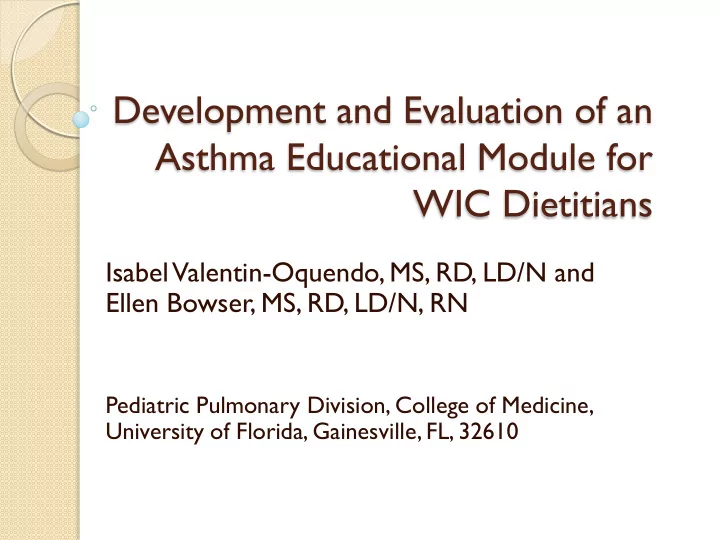

Development and Evaluation of an Asthma Educational Module for WIC Dietitians Isabel Valentin-Oquendo, MS, RD, LD/N and Ellen Bowser, MS, RD, LD/N, RN Pediatric Pulmonary Division, College of Medicine, University of Florida, Gainesville, FL, 32610
Background and Purpose Federal guidance for the Supplemental Nutrition • Program for Women, Infants and Children (WIC) identifies asthma as a nutritional risk. Results of a 2009 needs assessment of Florida • WIC dietitians indicated they lacked formal instruction on the nutritional implications of pediatric asthma. The objective of this project was to evaluate the • efficacy of a web-based continuing education program improving the knowledge and attitudes of Florida WIC dietitians in the nutritional implications of asthma in children.
Method A web-based continuing education (CE) module was developed using Microsoft PowerPoint format and audio-capture. The module included asthma pathophysiology, treatment and nutritional implications. After pilot-testing the initial module, a revised program was distributed statewide via the Florida WIC intranet and advertised by program directors and state WIC staff.
http://www.peds.ufl.edu/divisions/pulmonary/training_module/
Process The WIC dietitians completed the pre-test, watched the module, and then completed the post-test. After completion the participants received a certificate of completion and 1 CPE from the Commission on Dietetic Registration of the American Dietetic Association. Each participant used a unique four-digit code to identify both the pre-and post-tests so that these could be matched. The pre-and post-tests were completed via Survey Monkey. The pre- and post-tests included questions that assessed knowledge gained through multiple-choice questions and change in attitudes by a Likert scale. Ten (10) identical questions were on the pre- and post-tests. Non-completion of the post-test was the only exclusion criterion. Sixty-six (66) matched pre- and post-tests were compared using paired t-test analysis via SAS.
Results: Knowledge Change Percentage correct for each question, pre-versus post-tests 120 100 100 92 85 91 Percentage Correct 100 82 97 74 80 92 79 60 38 Pre-test 43 40 Post test 20 0 Post test Q-3 Q-4 Q-5 Pre-test Q-6 Q-7 Q-8 Question number
Results: Attitude Change “I feel knowledgeable about nutritional implications of asthma in children.” Mean values 4.5 4.02 4 Strongly disagree <.-------> Strongly agree 3.5 2.89 3 2.5 2 1.5 1 0.5 0 Pre-test Post test p<0.001
Results: Attitude Change “I feel knowledgeable about the types of medications used for asthma in children.” Strongly disagree<---------->Strongly Agree Mean values 3.88 4 2.7 2 0 Pre-test Post test p<0.001
Results: Attitudes Change “I feel knowledgeable about the relationship between asthma and overweight in children.” Strongly disagree<----->-Strongly Agree Mean values 3.94 2.92 4 2 0 Pre-test Post test p<0.001
Conclusion and Discussion Use of a web-based continuing education module • on the nutritional implications of asthma in children resulted in an significantly increased knowledge and improved attitudes of Florida WIC dietitians. The production and distribution of a web-based • educational module is a reliable method for professional development of WIC dietitians. This method of continuing education • development may be used for other topics and disciplines in public health settings.
Recommend
More recommend